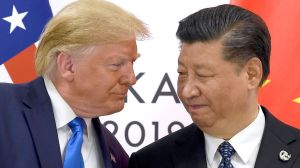Be wary of the effect, not process, of reform
PICTURE an investment consultant with his own website who regularly monitors stocks on his laptop and is also a trustee of the Putighe Matt,...

PICTURE an investment consultant with his own website who regularly monitors stocks on his laptop and is also a trustee of the Putighe Matt, Udipi, and the Bharatiya Chaturdham Ved Bhawan Nyas, Allahabad. P N Vijay, the new convenor of the BJP’s economic cell, combines his interests in commerce and spiritualism with elan.
Since his chamber in the party headquarters is not yet ready, Vijay continues to work from his swanky Kailash building office in the capital’s Connaught Circus. The distance has helped Vijay maintain his ideological position: Formerly a vice-president with Citibank, this 51-year old banker — a product of IIT and Presidency College, Chennai — is an out and out supply side neo-classical monetarist in a parivar largely swamped with Swadeshi brand cadres. In an exclusive interview with Ajit Kumar Jha, Vijay defends the NDA government’s policy of economic reforms. Excerpts:
With Swadeshi cries getting louder in the Sangh Parivar’s ranks, do you think that the economic reforms is bound to fail?
No, not at all. The cabinet committee of disinvestment will review its policies after three months. After all, from the beginning, policies of disinvestment and foreign investment were part of the NDA government’s agenda. We realised that the mood of the country was for reforms. We are, therefore, pushing for faster and faster growth.
The SJM argues that in the name of divestment the NDA government wants to create private monopolies. After all, why did the government not have a policy for creating competition before divestment?
I don’t agree. Even after the IPCL/BPCL divestment, the IOC would have ended up with 55 per cent of the market share. Also there was an implicit understanding that the same buyer cannot get both the companies. The NDA government is working on setting up a competition policy that will regulate private monopolies. I do, however, agree that such regulatory policy should have been put in place before disinvestment.
What about the Swadeshi argument that growth without job creation does not help?
We have a fundamental intellectual difference with them. I believe that there is no way of generating employment without increasing growth. And growth increases only by increasing investment. Redistribution of wealth by state intervention does not lead to growth and certainly does not generate productive employment. It simply leads to a funny trend in employment, with more and more people employed in unprofitable business.
But what about the modern phenomenon of ‘jobless growth’? Since the labour market is comparatively inelastic and modernisation is basically through labour-replacing technology?
That is bound to happen in the short-run. Modernisation via efficient machines leads to labour eviction. But let us not only consider creation of jobs in manufacturing. After all, only 8 per cent of employment exists in the formal sector. What about employment creation in the services sector? Consider the opening up of the telecom sector. About one million jobs have been created via broadbanding and networking. The basic problem in the country is inflexible labour laws. If you cannot fire, in effect it means you cannot hire.
Employment creation in the services sector can only help urban areas. But what about the countryside, where 70 per cent of Indians live?
A: There is no divide between rural and urban India. There is only one India, which is seamless. People in villages also have cable connections. BJP president Venkaiah Naidu rightly argues the need to build a national market for agriculture. It is because of controls that we find tomatoes cost 30 paise per kilo in Mysore, Rs 3 in Bangalore but five times that in Delhi. We need to spend on asset creation in the rural areas, like roads, minor irrigation and handicrafts. That will create jobs in the countryside.
Reforms might prove to be good economics, but will it lead to success in the elections, especially since the effects may not reach the common man?
I believe good economics is always good politics. If we create an economy of surpluses, and keep inflation in check, it will automatically lead to political success in elections. We must be wary of the effects of reforms, not the process of reforms.







- 01
- 02
- 03
- 04
- 05
























